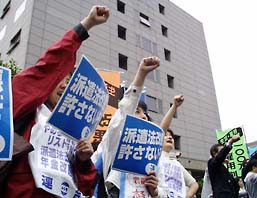|
Photo: 500 people chanted "Heed RENGO's demands" before the Diet, May 19.
 After
pushing its 7-point demands for the Dispatched Labor Law Amendment,
RENGO held an emergency rally on the evening of May 19 when the labor
committee in the House of Representatives passed the five-party unification
bill regarding the revision of the Dispatched Labor Law and the Employment
Security Law. Further, RENGO ratified its judgement on the amendment
by the three opposition parties and decided on its strategy for the
amendment at the 24th Central Executive Committee held the following
day on May 20. After
pushing its 7-point demands for the Dispatched Labor Law Amendment,
RENGO held an emergency rally on the evening of May 19 when the labor
committee in the House of Representatives passed the five-party unification
bill regarding the revision of the Dispatched Labor Law and the Employment
Security Law. Further, RENGO ratified its judgement on the amendment
by the three opposition parties and decided on its strategy for the
amendment at the 24th Central Executive Committee held the following
day on May 20.
| RENGO's Judgement of the Unified Amendment by the Three Oppositional Parties (which eventually became the Five-Party Joint Amendment) and its Future Strategies |
The unitary demands that the three opposition parties agreed to, consist of most of the worker protection measures pursued by RENGO. However, the measures to "prohibit registered dispatchment" on newly planned temporary dispatched labor, which RENGO had placed such great importance on, were not adopted. This matter is highly regrettable and entirely unsatisfactory.
The following are the opposition parties' unitary demands for worker protection measures:
- Prevention against the substitution of conventional employment.
- Protection of the privacy of dispatched workers.
- Establish client responsibility for a) equal opportunity and b) sexual harassment in the workplace.
- Protection against the unilateral cancellation of dispatched laborer's contracts.
- Promotion of the adoption of social/labor insurance coverage for dispatched workers.
When liberalizing dispatchment services, RENGO concluded that it is critically important to add penalties to guarantee the effectiveness of the above measures considering that current employment and working conditions of dispatched workers who have been categorized into special fields.
RENGO studied the amendment based on the unitary demands that the three opposition parties agreed upon, and RENGO assesses that from the view of RENGO conclusion, the issues regarding protection of workers are nearly solved in the amendment. However, RENGO judged that the employment instability that registered dispatched workers must bear is still insufficient from this settlement.
On May 19, the Labor Committee in the House of Representatives passed the amendment with a slight revision as a political decision through their responsibility as a political party. The bill will be immediately sent to the House of Chancellors via the plenary session at the House of Representatives on May 21st.
On May 19, after the bill passed in committee, RENGO held a rally in front of the Diet, invited representatives from the three opposition parties and the Liberal Party, and reported on its progress and endorsed continuing action on this issue. RENGO determined to continue working at succeeding deliberations in the Upper House focusing on the matter of employment instability.
(The Outline, endorsed at the 24th Central Executive Committee.) |
 After
pushing its 7-point demands for the Dispatched Labor Law Amendment,
RENGO held an emergency rally on the evening of May 19 when the labor
committee in the House of Representatives passed the five-party unification
bill regarding the revision of the Dispatched Labor Law and the Employment
Security Law. Further, RENGO ratified its judgement on the amendment
by the three opposition parties and decided on its strategy for the
amendment at the 24th Central Executive Committee held the following
day on May 20.
After
pushing its 7-point demands for the Dispatched Labor Law Amendment,
RENGO held an emergency rally on the evening of May 19 when the labor
committee in the House of Representatives passed the five-party unification
bill regarding the revision of the Dispatched Labor Law and the Employment
Security Law. Further, RENGO ratified its judgement on the amendment
by the three opposition parties and decided on its strategy for the
amendment at the 24th Central Executive Committee held the following
day on May 20.